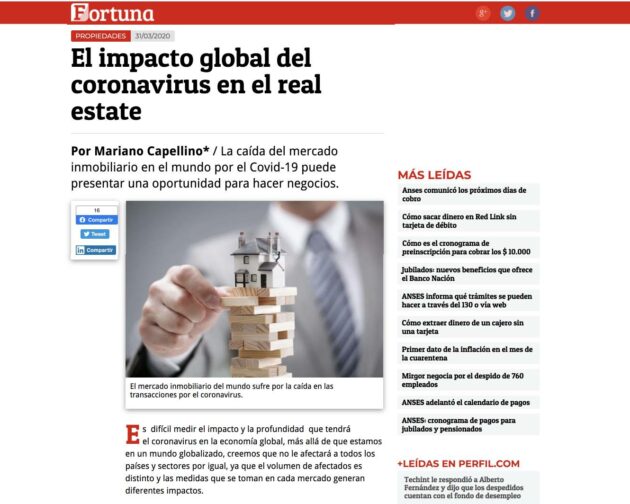By Mariano Capellino
The real estate market around the world is suffering a drop in transactions due to the coronavirus outbreak.
It is difficult to measure the impact of the coronavirus outbreak on the global economy, even though we are living in a globalized world, we think that no all countries will be impacted in the same way, as the number of people affected is different in each country and the measures adopted in each market will generate different consequences.
We believe that Europe is reaching its peak number of infected people, the USA is undergoing a strong growth in the number of infections, and Latin America is just starting, therefore the impact will be reflected at different moments in time.
We see that the central banks are providing strong incentive plans, injecting liquidity and providing support to avoid global collapse, high unemployment rates and a strong recession.
The real estate market activity will logically drop during this second quarter of the year as this type of operations are complex to perform online, such as visits, construction, deeds, mortgage loans, etc. We also consider that the decline in operations will depend on the level of severity involved in each country. Historically, pandemics generate a stop in the real estate sector and very specific declines for a short period of time, until they go back to normal.
Regarding real estate prices, they will depend on the impact on each country and their stock. Mainly in the office and retail segments, these being the most affected sectors, some windows of opportunity could be generated to acquire assets with discounts at the most seriously affected markets.
In terms of financial costs, most of the developed markets have considerably reduced their interest rates, in the USA they are near 0 and in Europe, the Euribor has already reached a negative level.
Therefore, this would lead us to have, in the short term, the lowest mortgage loan rates in history. This will enable many families, whose income has not been so far enough, to have the possibility of acquiring a property and; those people who currently have mortgage loans at higher rates will be able to refinance them at lower rates thus generating significant savings.
Also, large real estate investment funds would be eager to benefit from this rates reduction to refinance their portfolio assets and start new projects as the lower financing cost involved would make them more profitable.
On the other hand, investment properties could be benefited, compared to financial assets, since during critical moments where the stock markets have suffered a strong collapse and investors have lost between 4 and 8 years of appreciation, they may feel safer by investing in real estate.
In addition to this, the yield on the Treasury bonds in the USA, financial assets more similar to properties in terms of safety, are now extremely low, around 1% annually, compared to an annual average rent of 5% offered by a property, plus appreciation. Many investors would be benefited from this window of opportunity as they may replace their financial investment with real estate investments, therefore, the property market may become one of the most favorable markets in the medium term, once this situation has been sorted out.
Regarding Argentina and Latin America, it is even more complex to assess the impact as the level of affected people is still quite low, anyway, we have economies which are quite vulnerable to these events and we have seen some effects so far such as devaluations in the currencies of Mexico, Colombia, Brazil, drop in the prices of commodities and strong capital flight, which allow us to anticipate that a significant impact could take place.
*Founding Partner of Inmsa, member and co-founder of the investments board.
If you need advice on Real Estate Investments, contact us by clicking here
Source: Revista Fortuna

